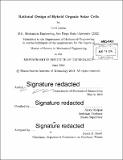Rational design of hybrid organic solar cells
Author(s)
Lentz, Levi (Levi Carl)
DownloadFull printable version (9.785Mb)
Other Contributors
Massachusetts Institute of Technology. Department of Mechanical Engineering.
Advisor
Alexie Kolpak.
Terms of use
Metadata
Show full item recordAbstract
In this thesis, we will present a novel design for a nano-structured organic-inorganic hybrid photovoltaic material that will address current challenges in bulk heterojunction (BHJ) organic-based solar cell materials. Utilizing first principles Density Functional Theory (DFT), we show that layered inorganic phosphates and tradition organic dyes can be combined to form a new class of bulk heterojunction photovoltaic with high electron and hole mobilities with low exciton recombination, potentially enabling very high efficiency with existing organic-based solar-cell molecules. We will discuss the physical origin of these properties and investigate several approaches for engineering the electronic structure of these materials. By using these methods, it will be possible to engineer the transport and optical properties of these materials, with potential applications beyond photovoltaics in areas from organic electronics to photoactuators.
Description
Thesis: S.M., Massachusetts Institute of Technology, Department of Mechanical Engineering, 2014. Cataloged from PDF version of thesis. Includes bibliographical references (pages 113-117).
Date issued
2014Department
Massachusetts Institute of Technology. Department of Mechanical EngineeringPublisher
Massachusetts Institute of Technology
Keywords
Mechanical Engineering.